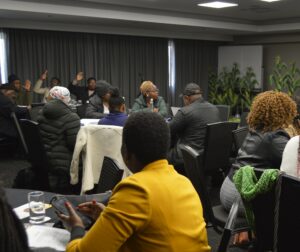Small-scale growers are vital contributors to South Africa’s food system, ensuring local food security, creating jobs, and stimulating rural economies. Yet for many, expanding into formal markets remains out of reach. Strict requirements for compliance with Good Agricultural Practices (GAP) often serve as a barrier, leaving smallholder farmers excluded from more lucrative opportunities.
This reality prompted the launch of a recent initiative under the EU’s Food Safety for Africa project, supported by the Centre of Excellence in Food Security. Designed to bridge the divide between policy requirements and smallholder realities, the training programme provides practical and accessible guidance that moves beyond theory. As Dr Willeke de Bruin, project manager and CoE-FS post-doctoral researcher explained:
“Adherence to Good Agricultural Practices is a non-negotiable requirement for small-scale growers who want to expand their operations. Our training was started to bridge this gap by providing accessible, practical and context-specific guidance, moving beyond theory to concrete application.”
Learning through Theatre
Over the course of three workshops in Gauteng, nearly one hundred farmers affiliated with the Gauteng Department of Agriculture and Rural Development (GDARD) took part in the training. Rather than relying on a lecture format, the organisers worked with the University of Pretoria’s Drama Department to develop an interactive theatre performance.
The play, which was based on a specially designed illustrated guide, invited farmers to see common challenges played out on stage and then join the actors in exploring possible solutions. Reflecting on the use of Theatre in Education Dr de Bruin commented the following:
“Instead of being passive listeners, the farmers were invited to engage directly with the scenarios presented in the play, discuss the challenges portrayed and collaboratively devise solutions in a co-creative process,” the project manager noted. “This approach turns learning into an active, problem-solving event.”
Research into Practice
The initiative was led by a plant pathologist with a strong interest in food safety and smallholder farming systems. Years of research into the challenges faced by farmers shaped the design of the training. But the project also reflected a personal commitment by Dr de Bruin.
“My motivation goes beyond academic curiosity because I am deeply committed to ensuring that our research translates into practical, effective support that can genuinely improve farmers’ lives and livelihoods.”
Alongside the workshops, the team has also been developing online short courses on GAP and other food safety topics in collaboration with the University of Leeds, which will be launched in October.

Empowerment as an Outcome
The workshops focused on the essentials of GAP – the processes needed to ensure food is both safe and of high quality. But the real outcome went beyond knowledge transfer. The sessions were designed to build confidence, foster collaboration, and equip participants with tools to apply GAP in their own contexts.
“By using an interactive, co-creative model, the farmers weren’t just told what to do; they actively participated in developing solutions that made sense for their specific contexts,” explained the project manager.
Supporting Smallholder Farmers
Small-scale growers, while deeply knowledgeable about their crops, often face significant obstacles when navigating formal supply chains. Access to markets, finance, and targeted training remains a critical need. Recognising this, the programme situates itself within a broader commitment to strengthening South Africa’s food system.
“Supporting them is not just about helping individual businesses, but also about strengthening our entire food system, promoting resilience and driving inclusive economic growth.”
Looking Forward
The success of the workshops has highlighted the potential of interdisciplinary, arts-based approaches to agricultural training. There is strong demand to expand the model to cover a wider range of farming and processing topics. Dr de Bruin believes the future lies in scaling this approach:
“Our vision is to see more small-scale growers successfully producing safe, healthy fresh produce – and accessing the markets that will sustain their businesses and their communities.”
The involvement of the University of Pretoria’s Drama Department, together with an illustrated guide created by a UP Arts student whose father is a smallholder grower, brought authenticity and depth to the project.
Respect at the Core
At its heart, the initiative reflects a philosophy of respect. It recognises farmers not simply as recipients of knowledge, but as experts in their own right. Dr de Bruin said the following:
“This training is impactful because it is built on respect for the farmer. It moves away from a top-down, ‘expert-knows-best’ model to one of collaboration and co-creation. It acknowledges that farmers are experts in their own right and that the most sustainable solutions are the ones developed together.”
By combining science, art, and lived experience, this training has set a precedent for how knowledge can be shared in ways that are inclusive, transformative, and empowering for the farmers who are essential to South Africa’s food future.



